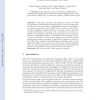Free Online Productivity Tools
i2Speak
i2Symbol
i2OCR
iTex2Img
iWeb2Print
iWeb2Shot
i2Type
iPdf2Split
iPdf2Merge
i2Bopomofo
i2Arabic
i2Style
i2Image
i2PDF
iLatex2Rtf
Sci2ools
132
click to vote
SDL
2001
2001
Timed Extensions for SDL
In this paper we propose some extensions necessary to enable the speci cation and description language SDL to become an appropriate formalism for the design of real-time and embedded systems. The extensions we envisage concern both roles of SDL: First, in order to make SDL a real-time speci cation language, allowing to correctly simulate and verify real-time speci cations, we propose a set of annotations to express in a exible way assumptions and assertions on timing issues such as execution durations, communication delays, or periodicity of external inputs. Second, in order to make SDL a real-time design language, several useful real-time programming concepts are missing. In particular we propose to extend the basic SDL timer mechanism by introducing new primitives such as cyclic timers, interruptive timers, and access to timer value. All these extensions relies on a clear and powerful time semantics for SDL, which extends the current one, and which is based on timed automata with urg...
Related Content
| Added | 31 Oct 2010 |
| Updated | 31 Oct 2010 |
| Type | Conference |
| Year | 2001 |
| Where | SDL |
| Authors | Marius Bozga, Susanne Graf, Laurent Mounier, Iulian Ober, Jean-Luc Roux, Daniel Vincent |
Comments (0)

